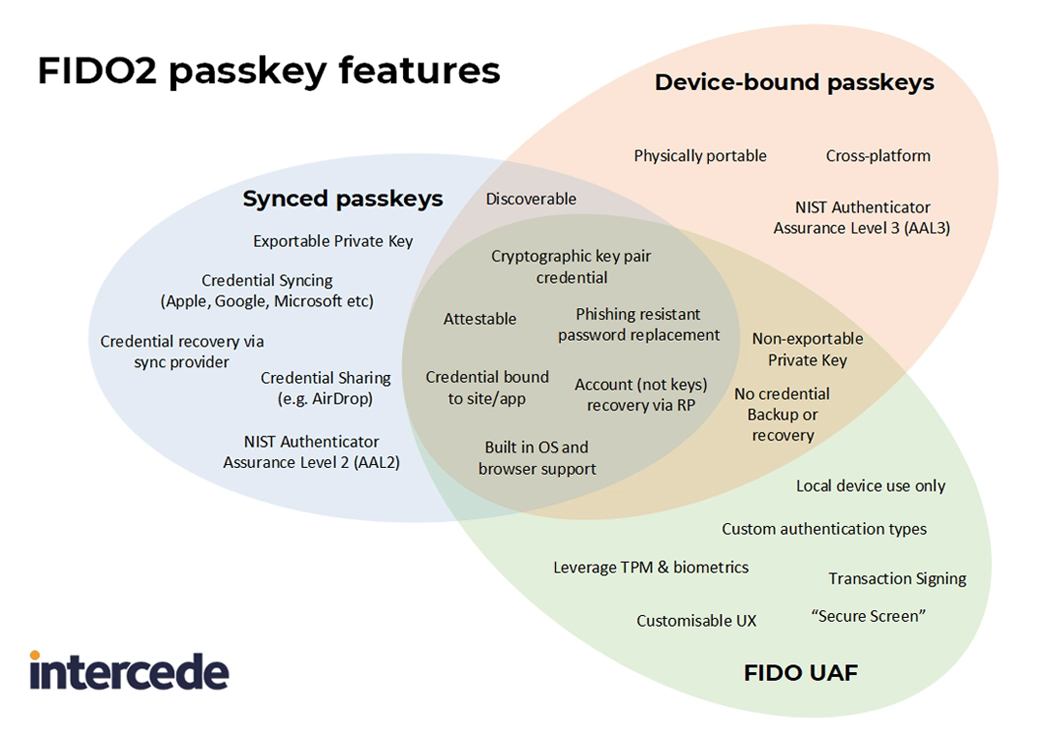PASSKEYS
Passkeys are a new way of signing into websites and
applications without using passwords. They are based on a FIDO web
authentication standard that uses cryptographic keys to verify an individual’s
identity. Passkeys are more secure and convenient than passwords because they replace
passwords with cryptographic keys, and they can be used with biometric sensors
(such as fingerprint or a facial matching) or PIN. You can create and use
passkeys on multiple devices, such as Windows, Android, or iOS or dedicated
hardware tokens such as a YubiKey.
KEY CAPABILITIES
Enhanced Security
: Passkeys provide a superior level of
security compared to traditional passwords. They are based on public-key
cryptography, effectively replacing passwords with a secure cryptographically
signed authentication process, eliminating the risk of interception and
compromise, effectively providing passwordless experience. Additionally,
passkeys are resistant to phishing attacks, as the private key used for
authentication remains securely on the device.
User-Friendly Authentication: Passkeys eliminate the need
for traditional passwords, which are often forgotten, weak, or susceptible to
social engineering tactics. Instead, users can authenticate using their
device's biometrics or PIN, providing a more convenient and secure login
experience. With Passkeys there are no
more passwords to remember as they are simply replaced with a more secure and
convenient alternative.
No More Password Resets: With passkeys, password resets
become a thing of the past. Users no longer need to wait for emails, enter
recovery codes, or navigate complex password reset processes. This reduces the
burden on IT support and improves user productivity.
Cross-Platform Compatibility: Passkeys are designed to work
seamlessly across different devices and platforms, including Windows, macOS,
Android and iOS. This ensures that users can access their accounts securely and
conveniently from any device they prefer, as the underlying WebAuthn technology
is widely supported by various platforms.
Reduced Risk of Data Breaches: Passkey-based authentication
can significantly reduce the risk of data breaches and associated financial
losses. By eliminating the vulnerabilities of passwords, organizations can
protect sensitive data and minimize the likelihood of cyber-attacks.
Compliance and Regulatory Benefits: Passkeys adhere to FIDO
Alliance standards and help you to meet compliance requirements, such as NIST
SP800-63B, PCI DSS, GDPR, and HIPAA. Adopting passkeys can help organizations
demonstrate their commitment to data security and comply with industry
regulations.

Passkeys bring a variety of benefits across the enterprise
- Improved security - based on a public-key cryptography, Passkeys remove the need to enter your email address and password into login fields. Passkeys are phishing resistant and significantly better protection than passwords as they cannot be guessed or shared as the user doesn’t know the key.
- Easy integration – MyID MFA allows organisations to protect cloud, on-premise applications and the Windows Desktop login process with Passkeys by supporting standard protocols such as OpenID Connect and SAML.
- Securely synced across devices - Passkeys can be synced across devices enabling recovery and backup.
- Reduction in account lockouts - As users don't need to remember passwords, they are less likely to be locked out of their accounts, meaning no more password resets.
- Reduced Password Fatigue - Passkeys eliminate the need to create, remember, and manage complex passwords for multiple accounts. They are automatically generated and stored on the user's device, making the authentication process seamless and hassle-free.
- No need to remember multiple credentials - simply uses FaceID or TouchID for identity authentication.
- Enhanced Security: Passkeys are significantly more secure than passwords due to their use of asymmetric (private/public key) cryptography and device-based authentication. They are stored securely on the user's device and never transmitted over the internet during authentication, eliminating the risk of phishing attacks and password breaches
-
Compliance with Regulatory standards: Gives your organization the peace of mind that you have systems in place to meet regulatory cyber security standards and are following best practice.
- Improved User Experience: Passkeys offer a more seamless user experience compared to passwords. Users don't need to juggle multiple passwords or deal with the frustration of forgotten or compromised credentials. The intuitive authentication process reduces friction and improves overall user satisfaction.
BENEFITS OF PASSKEYS
Passkeys offer a compelling alternative to traditional passwords, providing enhanced security, a simplified authentication process, and reduced administrative burden. As passkeys become more widely adopted, they are expected to become the preferred authentication method for modern digital interactions, providing a more secure, efficient, and user-friendly experience for both organisations and their users.
Find out more about Passkeys
If you are ready to book a demo, simply click the button below and we will arrange a demo of PASSKEYS
demo requestTrusted by Governments and Enterprises Worldwide
Where protecting systems and information really matters, you will find Intercede. Whether its citizen data, aerospace and defense systems, high-value financial transactions, intellectual property or air traffic control, we are proud that many leading organizations around the world choose Intercede solutions to protect themselves against data breach, comply with regulations and ensure business continuity.


